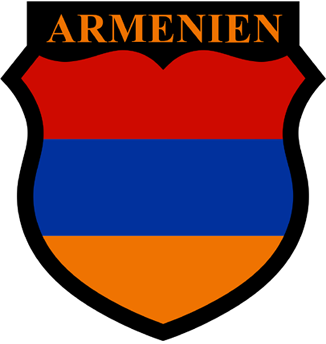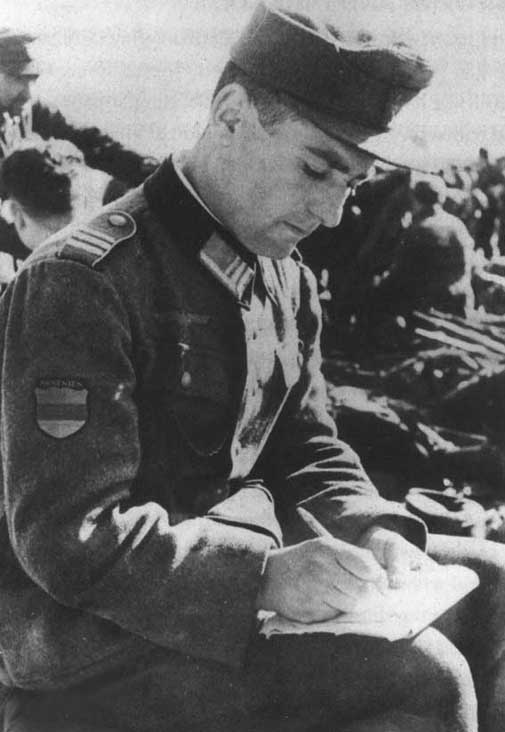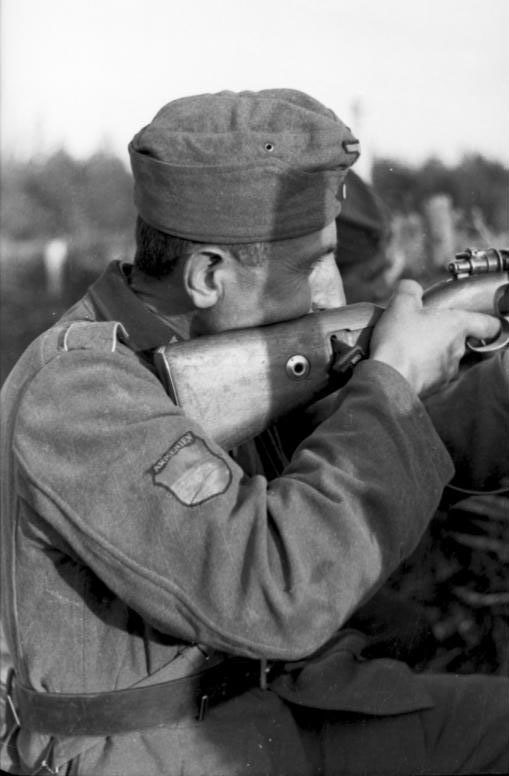
Interview with Hagop, Armenian Waffen-SS volunteer. Upper Arlington, Ohio, 1987.


Interview with Hagop, Armenian Waffen-SS volunteer. Upper Arlington, Ohio, 1987.

Hagop: I served for a very short time in the unit called Galician; it was made up of mostly Ukrainians who opposed Stalin. I was in this unit for a very short time and then sent to a full Armenian battalion. This was part of the German army, not the SS. Later on at the end of the war, a full SS unit of Armenians was formed.
Can I ask how you came to fight for Germany?
Hagop: Yes, but first I must tell you a little about Armenia. It is a nation that has strong Christian roots in the most orthodox way. Because of this we have faced the anger of the Muslims, resulting in many wars. The most recent was with Turkey, which resulted in an attempt to depopulate the area and kill us.
This caused many Armenians to flee into other areas, mainly Europe or the Middle East. The Germans were the only ones to offer a hand to us when Hitler came to power. I come from Armavir and I remember that the Germans sent goods to us after a famine.
Stalin did not treat us well, and even though most went along with his rule, many opposed him. We had a bad distrust of the Soviet system, and of the Turks. I had lost much family due to the Turks and their harsh treatment. They starved, beat, shot, and raped the Armenian people.
There was hatred against them, and then came the Bolsheviks who did not like us either. They closed churches, deported clergy, and stole from the people to enrich the new state. They gave just enough protection and food to make us not revolt. Then in 1941 word came of the German attack.
There was a group, pretty large, I believe called the Dashnaks, who wanted to join with Germany to free our land. I liked what they believed, and I knew we needed to be free. The Soviets forced large numbers of Armenians into the army to fight; I was able to flee when they came into our town.
I had no desire to fight for the Soviets, so I made my way north with others to reach the Germans. They were smart and sent Armenians to search us out and tell us they welcomed an alliance. We were given instructions and directions on where to reach safe areas.
I was in a camp for refugees and in 1942 we were recruited to serve against Stalin, but I had a mistake in my papers. I ended up being sent to Galicia and was put into training for the new division being formed. I quickly had to have this corrected as I did not speak the language and wanted to be with my native comrades.
I did see some action against the partisans with this unit; the Galician volunteers were fanatics who hated Stalin and any other enemies with a passion. I remember their flag, and they also flew the black and white SS flags as well. Any partisan who surrendered was harshly treated I remember. I kept pressing to go to another unit and it was soon granted.
I was then placed in the Armenian battalion 809, which was to my liking. I had to go through additional training. We learned German terms, tactics, weapons, and commands. Many of us were used to hunt partisans, build roads and bridges, or other tasks. This made some upset as the goal was to fight Stalin, but the Germans did a good job of showing how each task served that goal.
I want to say to you also that we did not fight for Hitler or Germany per se; we fought to free our homeland. There is a difference; many of us understood Germany was in a position to help so we joined in. I must say that we were treated well and welcomed as friends; I saw no prejudice like you might think.

[Above: Armenian volunteer]
Did you ever fight against Russian soldiers?
Hagop: Yes, we did have engagements with them. I fought against both partisans and soldiers. I can tell you they were both cunning and sneaky. They did not follow the conventions of war, and often shot prisoners. I understand Soviet soldiers, mainly by the political commissars, were shot before they could surrender.
Something I remember is we were given old weapons, often captured Soviet ones, which was disappointing. The Germans told us they were low on weapons so we had to use whatever was at hand. We had many days on the range to become good shots.
We were sent towards our home to participate in its liberation, however, the Soviets had a large army, some made up of Armenian battalions, which stopped us. We just did not have enough men or support to force the line. We took heavy losses and it was here that I decided I did not want to keep this up.
A few men suggested we flee to Syria as there were enclaves of Armenians there and there was strong talk of leaving. Our German commander met with us and told us he understood our feelings, but that this was an important fight. We were needed badly and to leave would leave the world to a bad fate.
We took a vote and agreed to stay; our leader was even able to get us better weapons. By this time Stalingrad had fallen, and the Soviets were on the offensive. As a battalion we were decimated but fought very hard.
The Soviets would attack us in waves, and we dug trenches and fortifications. We had machine guns, mortars, and even artillery support. They would come at our lines and keep coming despite heavy losses. We heard rumors they were using our women as soldiers to charge at us. We never saw them, but we always kept our eyes out for them, praying we would never meet.
I learned later that many women were used as common infantry and the Germans hated shooting at them. So much that many Germans died as a result of refusing to believe they were combat soldiers. They had women snipers also, which took a toll. I saw one surrendering but was quickly shot by one of our men. He had lost a good friend by her hand.
I understand you were part of the battles in Normandy during D-Day?
Hagop: I was not part of the fighting in Normandy, but we did get sent to the area. We were pulled out of the fighting in the east, which made many unhappy. We volunteered to fight Stalin, and no one else. Some men were visibly upset when we were told we were going to Holland.
Many asked for transfers to other units fighting in the east. Rumors were spread that the Germans did not think we fought well. When we arrived in Holland the Allies dropped leaflets on us saying we were being used as cannon fodder. In my time in the service, I can say this decision by the Germans made no sense.
I know they were short of men and desperate to protect the coast, but to use us was a mistake. We had desertions I remember, and the Germans tried to offer better food and duties. They sent us to a place by the coast that flooded often, we hated it there, and there was nothing to occupy our free time.
Even allowing Dutch prostitutes in our camps did not really help the mood very much. I know our officers tried to do what they could to help us, but we wanted to be in the east, close to home. We kept this life up until the landings in France, and then we were sent to fight the Allies.
We arrived right in time for the Allies to have launched a massive attack which ended the German defense. I was sent one day to scout forward and was captured by a British patrol. They were so full of victory by this point; they had a routine for all the prisoners they were taking.
I was quickly sent to the rear, fed, interrogated, and told for me the war was over. Rumors were that the Allies would be turning all eastern people over to the Soviets. This meant death so we made the decision to escape. At the end of the war the air was less strict and I was being moved south.
I had a chance to flee when they herded us in a mass group, and fled on a boat to Syria where I was able to meet friends and start a new life. I was then able to bring my family to the US and have never looked back.

[Above: Armenian volunteer]
What do you think about the war crimes claims made against Germany?
Hagop: I will say that if they are real and true then punishment is merited, and has been done. I was there and I believe we acted with honor and even restraint. I do not tell you this lightly; the idea of a German military acting out as agents of terror is just not a true representation.
I have heard people tell me about their experiences with us, like commandeering homes, taking firewood, or detaining suspicious people. I am sorry, but this is no crime it is an example of wartime policies all nations practice. Shooting spies, partisans, and traitors is something all nations have done as well. I saw nothing that made me question if I was on the correct side. The Germans did have a matter of fact attitude that left no room for flexibility many times. This is a character flaw and every people has one of these.